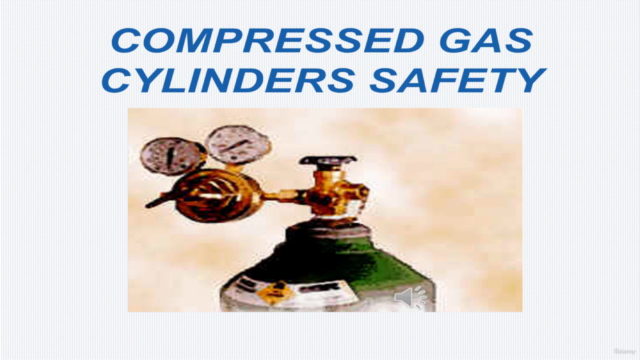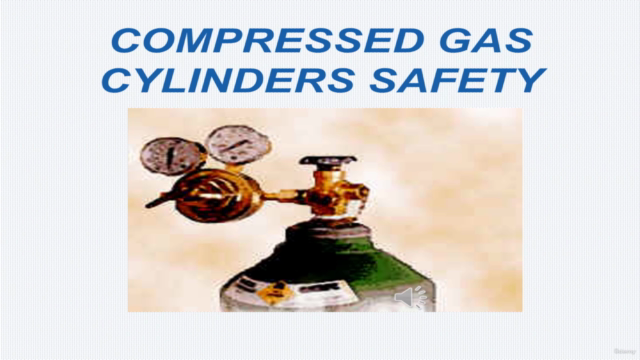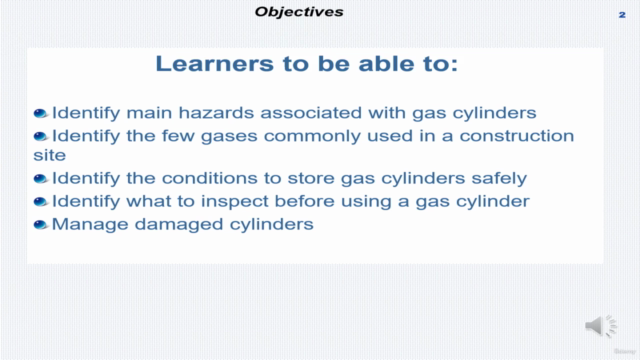Compressed Gas cylinders safety

Why take this course?
Safe Use, Handling, Transport and Storage of Compressed Gas Cylinders in Construction Industry
Course Headline: Safe use, handling, transport, and storage of compressed gas cylinders in terms of precautions to be taken.
Course Description:
This comprehensive course is designed to heighten awareness regarding the safe use of compressed gas cylinders within the construction industry. It addresses the critical safety issues that often lead to fire and explosion incidents, which are common in this sector. The primary causes of these incidents include:
- Lack of Knowledge: Not understanding the risks associated with handling and storing gas cylinders.
- Inexperienced Operators: Those who handle gas cylinders without proper training.
- Lack of Inspection and Maintenance: Failing to regularly inspect and maintain gas cylinders.
- Uncontrolled Hot Work: Performing hot work without adequate precautions.
- Unsafe Handling: Improper handling of gas cylinders and hose pipes.
- Unsafe Storage: Incorrect storage practices for gas cylinders.
- Not Prepared for Emergencies: Being unprepared for fire and explosion situations.
- Neglecting Hydro Testing: Overlooking the necessity of periodically testing the condition of gas cylinders through hydro tests.
🛠️ Course Objectives: To equip learners with the knowledge and skills necessary to safely use, handle, transport, and store compressed gas cylinders on construction sites. The course is rich with practical insights, including a plethora of images captured directly from construction sites to illustrate real-world scenarios.
Course Breakdown:
Chapter 1: Introduction & Course Objectives
We'll start by setting the stage for why this course is essential and what you can expect to learn.
Chapter 2: Hazards & Gas Characteristics
Here, we delve into the potential hazards associated with gas cylinders, introduce the European color codes for gases, and discuss the characteristics of common construction gases.
🔧 Chapter 3: Oxygen and Acetylene Hazards This chapter specifically addresses the risks associated with Oxygen and Acetylene, including the dangers of oxygen enrichment and prevention strategies.
Chapter 4: Cylinder Identification & Transportation Precautions
Learn how to correctly identify gas cylinders and understand the critical precautions required during their transport.
Chapter 5: Safe Storage & Securing of Cylinders
Illustrative examples show you the best practices for storing and securing gas cylinders on-site.
Chapter 6: Explosion Proof Requirements & Hose Pipe Care
Understand the importance of using explosion-proof electrical equipment around gas cylinders and proper care for Oxygen-Acetylene hose pipes.
Chapter 7: Handling Don’ts, Cylinder Care, and Cleanliness
Learn what not to do when handling gas cylinders and why maintaining cleanliness is so crucial.
Chapter 8: Fire Precautions & Confined Space Usage
Discover the necessary precautions to take when preventing fires, especially within confined spaces where gases are used.
Chapter 9: Regulator Checks, Damaged Cylinder Removal, and Hot Work Safety
This section covers how to perform regulator checks, remove damaged cylinders safely, and execute hot work in a way that protects surrounding services.
Chapter 10: Precaution Summary
We conclude the course with a summary of all the key precautions you've learned, providing a quick reference guide for safe practices.
Enroll now and take the first step towards ensuring a safer work environment on construction sites! 🛠️🚀
By completing this course, you will not only be safeguarding your own well-being but also contributing to the prevention of accidents that could impact your colleagues and project. Let's work together to make every construction site a safer place through informed and responsible handling of compressed gas cylinders.
Course Gallery




Loading charts...